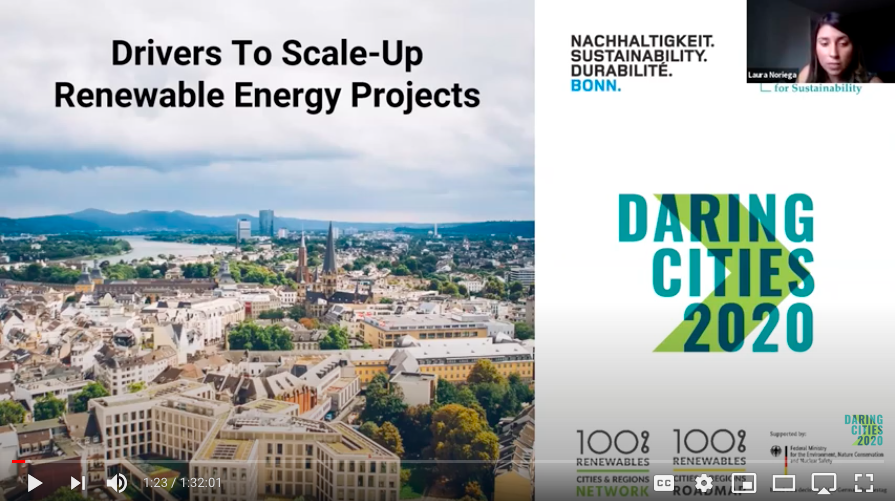
In order to access the video, you must create an account on Daringcities.org or log-in.
Climate & energy targets and action plans (roadmaps) will guide the sustainable energy transformation around the globe in cities and regions of all types and sizes. Local governments (LGs) can lead the way, but also need to learn how to do so. One decisive way LGs can contribute to is by creating 100% renewable energy (RE) roadmaps for their communities, including their governmental operations. In order to walk the talk local leadership is critical to ensure planning leads to action – effective renewable energy projects embedded in transformative roadmaps. This will not only lead to local job opportunities and green growth, but can contribute to achieving the Nationally Determined Contribution (NDC) targets and Sustainable Development Goals (SDGs), as well as other policy objectives.
Moving from the commitment, the RE roadmap is defined as an implementation strategy that identifies actions and actors, prioritizes projects, outlines financing approaches and focuses on the most feasible, impactful and bankable RE projects. For many city officials the processes on how to develop bankable and transformative renewable energy projects are unclear and lead to many questions. This webinar focuses on crucial enablers, drivers and barriers that the LGs face at every step of project development.
The moderator sets the scene, introducing the 100% Renewables Cities & Regions Roadmap Project and addressing the process of implementing action plans and 100% RE roadmaps through bankable and transformative projects with a positive local impact.
Three cities from the 100% Renewables Cities & Regions Roadmap Project share their RE status, as well as ongoing and future project plans, sharing experiences on local project development and implementation. They highlight various enablers, drivers and barriers for the national and local contexts. Experts from prestigious organizations then share their experiences, with a focus on lessons learned and giving practical tips for cities. An interactive discussion with the audience wraps up the session.
This session facilitates the exchange of knowledge, sharing of experience and lessons learned between experts and practitioners on how to localize the RE transition.
The main questions addressed in the session:
- What are the main drivers, enablers, and barriers at every steps of project implementation?
- Project idea identification (including preliminary ideas on site, technology, and environmental and social impacts)
- Data collection and energy modelling
- Project prioritization
- (Pre)-feasibility assessments
- Securing early stage finance
- Design and develop project models
- Formalize funding commitments and legal agreements
- Sustainable procurement
- Implementation, commissioning, operation & maintenance
- Monitoring, reporting and validation (MRV)
- Which policies or administrative procedures had to be created or changed to facilitate RE project development?
- How to identify and prioritize projects through a Roadmap?
- Which actors need to be involved at what stage – how can local energy utilities support project development?
- How to be legally and financially compliant to national regulations on foreign investments in local RE project development?
Viewers can expect to gain:
- Enhanced understanding of the different phases of developing bankable and transformative RE projects.
- Learning how to address challenges and foster enablers at every step of project development.
- Showcasing experiences from cities in different countries that are part of the 100% Renewables: Cities and Regions Roadmap Project.
- Lessons learned on enabling frameworks and administrative procedures that LGs can introduce to advance RE project development
- Better understanding on how different private (companies, banks) and public (LGs, national government) actors can work together to realize projects
This event is particularly interesting for city officials tasked with engaging their local stakeholders and access finance to implement RE projects. Hands-on recommendations can be derived from the experience of experts and practitioners dedicated to advance the local sustainable energy transition.
Moderator
- Rohit Sen, Head of Climate & Energy Action, ICLEI
Panelists
- Eng. Daniel Okia, Chief Officer, Energy & Industrialization, City of Kisumu, Kenya
- German Thefs, Planning Officer, Department of Sustainable Urban Mobility, Municipality of La Plata, Argentina
- Michael Renner, Programme Officer, IRENA
- Brian Capati, Urban Development Specialist, Cities Development Initiative for Asia (CDIA)
- Marie-Anne Serve, Project Coordinator, CoM SSA – AFD/Expertise France
- Yuliadi Ismono, Head of Energy Division at the Energy and Mineral Resources Provincial Office of West Nusa Tenggara, Indonesia
